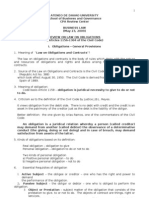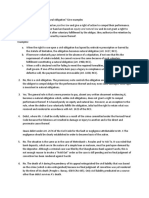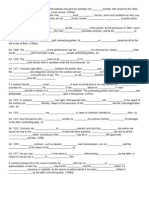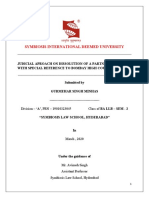100%(2)100% found this document useful (2 votes)
821 viewsClassification of Obligations According To Sanchez Roman
Classification of Obligations According To Sanchez Roman
Uploaded by
Samuel ArgoteThe document classifies obligations according to Sanchez Roman into four categories: (1) juridical quality, parties, object, and perfection/extinguishment. For juridical quality, obligations are natural, civil, or mixed depending on the applicable law. For parties, obligations are unilateral/bilateral and individual/collective. For object, obligations are determinate/generic, simple/multiple, positive/negative, and so on. For perfection/extinguishment, obligations are pure, conditional with terms, or subject to conditions.
Copyright:
© All Rights Reserved
Available Formats
Download as PDF, TXT or read online from Scribd
Classification of Obligations According To Sanchez Roman
Classification of Obligations According To Sanchez Roman
Uploaded by
Samuel Argote100%(2)100% found this document useful (2 votes)
821 views2 pagesThe document classifies obligations according to Sanchez Roman into four categories: (1) juridical quality, parties, object, and perfection/extinguishment. For juridical quality, obligations are natural, civil, or mixed depending on the applicable law. For parties, obligations are unilateral/bilateral and individual/collective. For object, obligations are determinate/generic, simple/multiple, positive/negative, and so on. For perfection/extinguishment, obligations are pure, conditional with terms, or subject to conditions.
Original Title
Classifications
Copyright
© © All Rights Reserved
Available Formats
PDF, TXT or read online from Scribd
Share this document
Did you find this document useful?
Is this content inappropriate?
The document classifies obligations according to Sanchez Roman into four categories: (1) juridical quality, parties, object, and perfection/extinguishment. For juridical quality, obligations are natural, civil, or mixed depending on the applicable law. For parties, obligations are unilateral/bilateral and individual/collective. For object, obligations are determinate/generic, simple/multiple, positive/negative, and so on. For perfection/extinguishment, obligations are pure, conditional with terms, or subject to conditions.
Copyright:
© All Rights Reserved
Available Formats
Download as PDF, TXT or read online from Scribd
Download as pdf or txt
100%(2)100% found this document useful (2 votes)
821 views2 pagesClassification of Obligations According To Sanchez Roman
Classification of Obligations According To Sanchez Roman
Uploaded by
Samuel ArgoteThe document classifies obligations according to Sanchez Roman into four categories: (1) juridical quality, parties, object, and perfection/extinguishment. For juridical quality, obligations are natural, civil, or mixed depending on the applicable law. For parties, obligations are unilateral/bilateral and individual/collective. For object, obligations are determinate/generic, simple/multiple, positive/negative, and so on. For perfection/extinguishment, obligations are pure, conditional with terms, or subject to conditions.
Copyright:
© All Rights Reserved
Available Formats
Download as PDF, TXT or read online from Scribd
Download as pdf or txt
You are on page 1of 2
Classification of Obligations according to Sanchez Roman:
(1) As to juridical quality:
a. Natural – when the obligation is in accordance with natural law.
b. Civil – when the obligation is in accordance with positive law.
c. Mixed – when the obligation is in accordance with both natural and positive law.
(2) As to parties:
a. Unilateral and bilateral – unilateral, where only one party is bound, and bilateral,
where both parties are mutually or reciprocally bound.
b. Individual and collective – individual, where there is only one obligor, and collective,
where there are several obligors. The latter may be joint, when each obligor is liable
only for his proportionate share of the obligation, or solidary, when each obligor may
be held liable for the entire obligation.
(3) As to object:
a. Determinate and generic – determinate, when the object is specific; generic, when the
object is designated by its class or genus.
b. Simple and multiple – simple, when there is only one undertaking; multiple, when
there are several undertakings. Multiple obligations may be conjunctive, when all of
the undertakings are demandable at the same time, or distributive, when only one
undertaking out of several is demandable. Distributive obligations, on the other hand,
may be alternative, when the obligor is allowed to choose one out of several which
may be due and demandable, or facultative, when the obligor is allowed to substitute
another obligation for one which is due and demandable.
c. Positive and negative – positive, when the obligor is obliged to give or do something;
negative, when the obligor must refrain from giving or doing something.
d. Real and personal – real, when the obligation consists in giving something; personal,
when the obligation consists in doing or not doing something.
e. Possible and impossible – possible, when the obligation is capable of fulfillment in
nature as well as in law; impossible, when the obligation is not capable of fulfillment
either in nature or in law.
f. Divisible and indivisible – divisible, when the obligation is susceptible of partial
performance; indivisible, when the obligation is not susceptible of partial
performance.
g. Principal and accessory – principal. When it is the main undertaking; accessory, when
it is merely an undertaking to guarantee the fulfillment of the principal obligation.
(4) As to perfection and extinguishment
a. Pure – when the obligation is not subject to any condition or term and is immediately
demandable.
b. Conditional – when the obligation is subject to a condition which may be suspensive,
in which case the happening or fulfillment of the condition results in the birth of the
obligation, or resolutory, in which case the happening or fulfillment of the condition
results in the extinguishment of the obligation.
c. With a term or period – when the obligation is subject to a term or period which may
be suspensive or from a day certain, in which case the obligation is demandable only
upon the expiration of the term, or resolutory or to a day certain, in which case the
obligation terminates upon the expiration of the term.
You might also like
- SPA - To Sell PropertyDocument2 pagesSPA - To Sell PropertyCamille Palma97% (29)
- Articles 1262-1317 OBLICON NotesDocument34 pagesArticles 1262-1317 OBLICON NotesDanielle Alessandra T. CalpoNo ratings yet
- Sample Template To Record PPE Usage & PPE Inventory Monitoring RecordDocument1 pageSample Template To Record PPE Usage & PPE Inventory Monitoring RecordOliver Reazon Ruelo50% (2)
- Yile Xu - MPT - in Re Field HogsDocument2 pagesYile Xu - MPT - in Re Field HogsYile XuNo ratings yet
- Articles 1207-1222 (Joint and Solidary Obligations)Document51 pagesArticles 1207-1222 (Joint and Solidary Obligations)Paul Alvin Alvarez Torio100% (2)
- Chapter 4. Reformation of ContractsDocument3 pagesChapter 4. Reformation of ContractsRose Anne CaringalNo ratings yet
- Reading Assignment 3Document13 pagesReading Assignment 3Jazrine Brielle100% (1)
- M03 - ObliCon - Breach of Obligations and Remedies PDFDocument14 pagesM03 - ObliCon - Breach of Obligations and Remedies PDFTam Garcia100% (2)
- 1181 - 1190 Pure and Conditional ObligationsDocument11 pages1181 - 1190 Pure and Conditional ObligationsscfsdNo ratings yet
- Natural Obligations (Arts. 1423-1430)Document2 pagesNatural Obligations (Arts. 1423-1430)Mike Gallego100% (1)
- Oblicon Midterm Exam 1Document25 pagesOblicon Midterm Exam 1Dark Princess ShadowNo ratings yet
- Table of Kinds of ObligationDocument6 pagesTable of Kinds of ObligationMarielle Joie PinedaNo ratings yet
- Law On Obligations - Edited 09 VersionDocument34 pagesLaw On Obligations - Edited 09 VersionJanetGraceDalisayFabreroNo ratings yet
- Oblicon Midterm ExamDocument3 pagesOblicon Midterm ExamSamuel Argote33% (3)
- Independent Contractor Agreement SG Xayalak VilaidaDocument7 pagesIndependent Contractor Agreement SG Xayalak VilaidaMao udangNo ratings yet
- Vgabeto OBLICON-003: Aclc College of TaclobanDocument11 pagesVgabeto OBLICON-003: Aclc College of Taclobanjumel delunaNo ratings yet
- Loss of The Thing DueDocument61 pagesLoss of The Thing Due.No ratings yet
- Article 1186: The Obligation Shall Be Deemed Fulfilled When The Obligor Voluntarily Prevents Its FulfillmentDocument15 pagesArticle 1186: The Obligation Shall Be Deemed Fulfilled When The Obligor Voluntarily Prevents Its FulfillmentPATRICIA AURELIONo ratings yet
- Week 5 (27 July) Advance Lecture: Title I, Chapter Iii Section 4 - Joint and Solidary ObligationsDocument21 pagesWeek 5 (27 July) Advance Lecture: Title I, Chapter Iii Section 4 - Joint and Solidary ObligationsGwen CaldonaNo ratings yet
- Chapter 3, Sec.4: Joint and Solidary ObligationsDocument3 pagesChapter 3, Sec.4: Joint and Solidary ObligationsPrinces Emerald ErniNo ratings yet
- Distinguish Civil From Natural ObligationDocument3 pagesDistinguish Civil From Natural ObligationGloria Trillo100% (1)
- Requisites of Mora SolvendiDocument4 pagesRequisites of Mora SolvendiRoyce HernandezNo ratings yet
- Oblicon Midterm Exam 2Document5 pagesOblicon Midterm Exam 2Dark Princess ShadowNo ratings yet
- OBLICON - Week 15-16 - INTERPRETATIONDocument9 pagesOBLICON - Week 15-16 - INTERPRETATIONjoyfandialanNo ratings yet
- ARTICLE 1163-1178 - Highlighted. Reviewer ARTICLE 1163-1178 - Highlighted. ReviewerDocument8 pagesARTICLE 1163-1178 - Highlighted. Reviewer ARTICLE 1163-1178 - Highlighted. ReviewerKaila Clarisse CortezNo ratings yet
- CHAPTER 6 (Arts. 1380-1389)Document6 pagesCHAPTER 6 (Arts. 1380-1389)Kaye RabadonNo ratings yet
- Civil and Natural ObligationsDocument2 pagesCivil and Natural Obligationsrai barrameda100% (1)
- ObliconDocument13 pagesObliconsakura50% (2)
- Art 1156-1180 Own NotesDocument11 pagesArt 1156-1180 Own NotesKEWKNo ratings yet
- Oblicon 1296-1304Document5 pagesOblicon 1296-1304bcarNo ratings yet
- Section 3 Alternative Obligations: For Damages When, Through The Fault of The DebtorDocument7 pagesSection 3 Alternative Obligations: For Damages When, Through The Fault of The DebtorRNo ratings yet
- Reviewer (Contracts, Chapter 1 To 5)Document8 pagesReviewer (Contracts, Chapter 1 To 5)MaiaNo ratings yet
- Arts. 1170 To 1192Document2 pagesArts. 1170 To 1192Louisa FerrarenNo ratings yet
- ObliconDocument14 pagesObliconJanice Mandalones Torejos100% (1)
- Art 1160Document2 pagesArt 1160Danica BalinasNo ratings yet
- Article 1226 OBLICONDocument1 pageArticle 1226 OBLICONGwen CaldonaNo ratings yet
- Voidable Contract1.Docx CompleteDocument3 pagesVoidable Contract1.Docx CompleteJudith CastroNo ratings yet
- Quiz 2 Nature and Effect of ObligationDocument3 pagesQuiz 2 Nature and Effect of ObligationStephanie MendozaNo ratings yet
- Article 1192-1195Document7 pagesArticle 1192-1195Charlenemae DichupaNo ratings yet
- Oblicon Midterms ProvisionsDocument9 pagesOblicon Midterms Provisionsrgtan3No ratings yet
- Obligations and Contracts: Midterm ExaminationDocument2 pagesObligations and Contracts: Midterm ExaminationChristian Zebua100% (1)
- Alternative Obligations Arts 1199 1206 1 PDFDocument9 pagesAlternative Obligations Arts 1199 1206 1 PDFAngelita Dela cruzNo ratings yet
- Villaroel vs. EstradaDocument2 pagesVillaroel vs. EstradaXryn MortelNo ratings yet
- Chap 3 Section 4 ObliconDocument6 pagesChap 3 Section 4 ObliconBela BellsNo ratings yet
- Module 5 C Joint and Solidary Divisible and Indivisible ObligationsDocument11 pagesModule 5 C Joint and Solidary Divisible and Indivisible Obligationsairam cabaddu0% (1)
- ObliCon Long Quiz ReviewerDocument4 pagesObliCon Long Quiz ReviewerSweden Fame MagnoNo ratings yet
- Extinguishment of Obligation - Novation - Notes - Atty LargoDocument9 pagesExtinguishment of Obligation - Novation - Notes - Atty LargoStephanie Dawn Sibi Gok-ong100% (3)
- Law On Obligations and ContractsDocument11 pagesLaw On Obligations and ContractsLeah Hope CedroNo ratings yet
- A2013 Law 101 Cases Reviewer (Obligations and Contracts) EALabitagDocument11 pagesA2013 Law 101 Cases Reviewer (Obligations and Contracts) EALabitagJanz SerranoNo ratings yet
- Chapter 3 Section 1 Pure and Conditional ObligationsDocument2 pagesChapter 3 Section 1 Pure and Conditional ObligationsLenny Ramos VillafuerteNo ratings yet
- Oblicon LessonDocument37 pagesOblicon LessonJane CA100% (1)
- Article 1216 and 1217, Civil CodeDocument2 pagesArticle 1216 and 1217, Civil CodeDindo Roxas100% (1)
- Arts 1199-1206Document10 pagesArts 1199-1206Kareen BaucanNo ratings yet
- Joint Obligations Hand OutsDocument3 pagesJoint Obligations Hand OutsLemuel Lagasca Razalan IVNo ratings yet
- Reciprocal ObligationsDocument5 pagesReciprocal ObligationsMarga Lera100% (1)
- Proof and Form of Notice: Alternative Obligation RescissionDocument7 pagesProof and Form of Notice: Alternative Obligation RescissionJake Pipania BaruadoNo ratings yet
- Art 1156 1178Document21 pagesArt 1156 1178Angelica Lasheras100% (1)
- Obligation and Contracts Article 1231-1256Document13 pagesObligation and Contracts Article 1231-1256Francesca Agatha EurabaNo ratings yet
- Sample Quiz 4 On ObliconDocument4 pagesSample Quiz 4 On ObliconRegina MuellerNo ratings yet
- Special Notes and Practical Exercises On Joint and Solidary ObligationsDocument7 pagesSpecial Notes and Practical Exercises On Joint and Solidary ObligationsMarisseAnne CoquillaNo ratings yet
- Nature and Effect of ObligationsDocument50 pagesNature and Effect of Obligationsgilbert213100% (1)
- Classifications of Conditions.: (1) As To EffectDocument1 pageClassifications of Conditions.: (1) As To Effectaes vNo ratings yet
- Law 1 Notes Kinds of ObligationsDocument2 pagesLaw 1 Notes Kinds of Obligationsjanys22No ratings yet
- Q: What Is An Obligation?: Obligations IDocument12 pagesQ: What Is An Obligation?: Obligations IRonbert Alindogan RamosNo ratings yet
- Art. 1156 - An Obligation Is A Juridical Necessity To Give, To Do, or Not To DoDocument113 pagesArt. 1156 - An Obligation Is A Juridical Necessity To Give, To Do, or Not To DoBowthen BoocNo ratings yet
- Environmental Scanning Research and AnalysisDocument4 pagesEnvironmental Scanning Research and AnalysisSamuel ArgoteNo ratings yet
- Oblicon Notes 1Document10 pagesOblicon Notes 1Samuel ArgoteNo ratings yet
- Philippine Tax System & Income Tax: LossesDocument50 pagesPhilippine Tax System & Income Tax: LossesSamuel ArgoteNo ratings yet
- Netflix Mcdonald'S: Profit / (Loss) Profit / (Loss)Document4 pagesNetflix Mcdonald'S: Profit / (Loss) Profit / (Loss)Samuel ArgoteNo ratings yet
- Reflection On DevelopmentDocument2 pagesReflection On DevelopmentSamuel ArgoteNo ratings yet
- Ronaele L. Magsalin: EducationDocument1 pageRonaele L. Magsalin: EducationSamuel ArgoteNo ratings yet
- Asya Candidate Information SheetDocument3 pagesAsya Candidate Information SheetSamuel ArgoteNo ratings yet
- BDO Life Employment Application Form With DPA FillableDocument10 pagesBDO Life Employment Application Form With DPA FillableSamuel ArgoteNo ratings yet
- A La Juventud FilipinaDocument1 pageA La Juventud FilipinaSamuel ArgoteNo ratings yet
- Oblicon Notes 1Document10 pagesOblicon Notes 1Samuel ArgoteNo ratings yet
- Steps 2 and 3 Combined Are Called A Swot Analysis. (Strengths, Weaknesses, Opportunities, and Threats)Document6 pagesSteps 2 and 3 Combined Are Called A Swot Analysis. (Strengths, Weaknesses, Opportunities, and Threats)Samuel ArgoteNo ratings yet
- Assignment On RizalDocument2 pagesAssignment On RizalSamuel ArgoteNo ratings yet
- Case StudyDocument12 pagesCase StudySamuel ArgoteNo ratings yet
- 1 Assignment DistributionDocument2 pages1 Assignment DistributionSamuel ArgoteNo ratings yet
- Antonio de Morga Sánchez GarayDocument6 pagesAntonio de Morga Sánchez GaraySamuel ArgoteNo ratings yet
- Historical Jesus: Quests For The Historical Jesus Portraits of Jesus CynicDocument1 pageHistorical Jesus: Quests For The Historical Jesus Portraits of Jesus CynicSamuel ArgoteNo ratings yet
- Marketing Plan of V6 Vegetable JuiceDocument34 pagesMarketing Plan of V6 Vegetable JuiceSamuel ArgoteNo ratings yet
- Mama MoDocument5 pagesMama MoSamuel ArgoteNo ratings yet
- Business Incubation Centre Facilities AgreementDocument11 pagesBusiness Incubation Centre Facilities AgreementkingsekaranNo ratings yet
- Oblicon ReviewerDocument28 pagesOblicon ReviewerChristelle DivinagraciaNo ratings yet
- Company LawDocument21 pagesCompany Lawadetunjiayomide2000No ratings yet
- Rent Agreement 2023 1H2Document4 pagesRent Agreement 2023 1H2rajdey542No ratings yet
- Passenger Liability (Mutual Revision & Special Contracts) ClauseDocument1 pagePassenger Liability (Mutual Revision & Special Contracts) ClauseHimanshu PatidarNo ratings yet
- ContractDocument20 pagesContractgur0% (1)
- Property Law PSDA - 017 & 059Document6 pagesProperty Law PSDA - 017 & 059Brahm SareenNo ratings yet
- Law On Sales Chaper 2 and 3Document3 pagesLaw On Sales Chaper 2 and 3Edith DalidaNo ratings yet
- Before The Hon'Ble Supreme Court of India: Participant Code-197RDocument27 pagesBefore The Hon'Ble Supreme Court of India: Participant Code-197RRISHANK TIWARINo ratings yet
- Acuvate 2Document13 pagesAcuvate 2Kaparthi GujjarNo ratings yet
- Interpretation of ContractsDocument2 pagesInterpretation of ContractsGiulía O'HaræNo ratings yet
- International Sales Representative AgreementDocument11 pagesInternational Sales Representative AgreementG BozzoNo ratings yet
- Channel Partner AgreementDocument4 pagesChannel Partner AgreementC S Prakash HandeNo ratings yet
- COMPLAINTDocument4 pagesCOMPLAINTCRISJUANMIGUEL NACPILNo ratings yet
- Module 5 - Extinguishment of An ObligationDocument19 pagesModule 5 - Extinguishment of An ObligationCriselyne BernabeNo ratings yet
- Romero vs. CaDocument8 pagesRomero vs. Cachristian villamanteNo ratings yet
- TRANSPO Case Digests - 3BBDocument56 pagesTRANSPO Case Digests - 3BBFrancois Amos PalomoNo ratings yet
- Letter of CreditDocument2 pagesLetter of CreditadifaahNo ratings yet
- Binaya Kumar Parida EMBA-2020-21, 1 Semester Business and Corporate Laws Assignment Roll No-16Document7 pagesBinaya Kumar Parida EMBA-2020-21, 1 Semester Business and Corporate Laws Assignment Roll No-16binay kumar ParidaNo ratings yet
- Sample of Answer-LocDocument2 pagesSample of Answer-LocSHAHEERANo ratings yet
- PBC vs. Dy G.R. No. 183774 November 14, 2012Document2 pagesPBC vs. Dy G.R. No. 183774 November 14, 2012Paula TorobaNo ratings yet
- DCFI - Rights and Duties of The Buyer and Seller in The Context of CISGDocument12 pagesDCFI - Rights and Duties of The Buyer and Seller in The Context of CISGAndré XavierNo ratings yet
- Draft Agreement For Commercial SpaceDocument8 pagesDraft Agreement For Commercial Spacehimika100% (1)
- Memorial For Claimant PDFDocument17 pagesMemorial For Claimant PDFAnamika VatsaNo ratings yet
- Waiver of Rights (Registered Land)Document2 pagesWaiver of Rights (Registered Land)Rolly Pagtolon-an100% (1)
- Bhagwani Bai v. LICDocument2 pagesBhagwani Bai v. LICRitvik SinghNo ratings yet











































































































